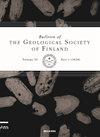聚氯化铝水预处理对管理含水层回灌中溶解有机质分解的影响
IF 1.3
4区 地球科学
Q2 GEOLOGY
引用次数: 0
摘要
本研究探讨了聚氯化铝(PACl)预处理对管理含水层补给(MAR)过程中发生的生物净化过程的影响。PACl处理用于废物和地表水处理,以去除有机物质。PACl能显著降低水体有机碳含量。然而,铝对微生物有毒,当PACl处理后渗入含水层(MAR)时,这可能是有害的。在本研究中,通过在四个测试柱中使用MAR站点的沉积物,研究了PACl预处理对MAR水净化过程的影响。其中两柱装的是经过PACl处理的水,其余两柱装的是没有经过PACl处理的河水。水在柱中的停留时间由直接取样逐渐提高到64天。监测的参数包括水的pH值、微生物活性和溶解有机碳(DOC)的分解。结果表明,各柱均有活性分解。有机物的分解和活/活性微生物细胞的数量在未经处理的水中略高,这可能意味着MAR系统的功能更好。然而,这也可能是由于较高的DOC起始浓度。本文章由计算机程序翻译,如有差异,请以英文原文为准。
The effect of water pre-treatment with poly-aluminiumchloride on the decomposition of dissolved organic matter in managed aquifer recharge
This study examines the effect of poly-aluminium chloride (PACl) pre-treatment on the biological purification process taking place during managed aquifer recharge (MAR). PACl treatment is used in waste and surface water treatment to remove organic material. PACl can decrease the organic carbon contents of water significantly. However, aluminium is toxic to microbes, which may be detrimental when the PACl treatment is followed by infiltration into an aquifer (MAR). In this study the effect of pre-treatment with PACl on the water purification process in MAR was examined, by using sediment from a MAR site in four test columns. Two columns were filled with PACl-treated water, and the remaining ones with river water without PACl. The residence time of water in the columns was raised from direct sampling gradually to 64 days. Among the parameters monitored were the pH of the water, microbial activity and the decomposition of dissolved organic carbon (DOC). The results showed active decomposition in all columns. Decomposition of organic matter, and the amount of living/active microbial cells, was marginally higher in the untreated water, which could imply a better functioning MAR system. However, this may also be due to higher DOC starting concentration.
求助全文
通过发布文献求助,成功后即可免费获取论文全文。
去求助
来源期刊
CiteScore
1.30
自引率
0.00%
发文量
5
审稿时长
>12 weeks
期刊介绍:
Bulletin of the Geological Society of Finland (BGSF) publishes research articles and short communications in all branches of geosciences. Contributions from outside Finland are welcome, provided that they contain material relevant to Finnish geology or are of general interest.

 求助内容:
求助内容: 应助结果提醒方式:
应助结果提醒方式:


